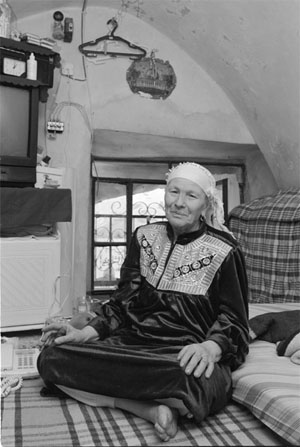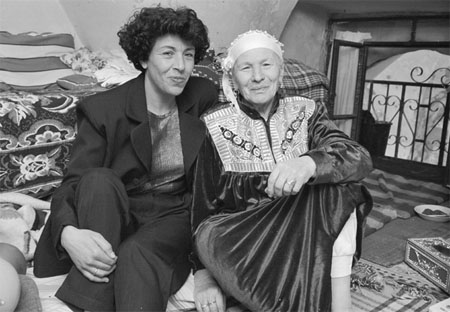
|
 |
| Hajji Rafiqa Sleimi. Photo: Leena Saraste |
Hajji Rafiqa Sleimi, Jerusalem Old City, June 11, 1998:
|
 Hajji Rafiqa Sleimi. Photo: Leena Saraste |
|
The eviction of Palestinians from their homes happens in different ways in different areas, and according to different 'laws'. In the Jerusalem area generally it's mainly through an anti-Palestinian manipulation of the rules about building permits. But in particular areas where Jews lay claims to ancient tombs or sanctuaries, it is more likely to be settlers that carry out evictions. This has been happening continuously in Silwan, Ras al-Amud, Wadi Joz, and the Old City. Though legally supposed to protect all residents, the Israeli police do little to prevent settler action.
A friend who works in a library that will be devoted to Jerusalem advises me to meet an old woman thrown out of her home by settlers some time back. The case attracted media attention at the time because of Hajji Rafiqa's advanced age (some 90 years), and the fact that she lives alone. Someone from a committee devoted to the Khalidi Quarter where Hajji Rafiqa lives, deep in the heart of the Old City, guides me to the ancient building. Here, somehow, the Hajji has managed to hold out even after the settlers' take-over of her home. On the way we pass an Israeli police station where we have to stop because the narrow street is full of settlers who are hauling up rolls of corrugated iron to the roof. M. says that this is how they expand their take-over, moving from roof-top to roof-top, then either breaking in or making life intolerable for residents on the floors below. We go up from the street to reach a central courtyard. Here a plaque proclaims the ownership of one of the fundamentalist Jewish groups, Ataret Cohanim. Hajji Rafiqa's 2nd floor home was taken over 10 years ago when she went briefly to stay with a married daughter. The settlers broke in and threw out all her belongings. She refused to leave, staying in the courtyard until they opened up for her a small storage room that opens off the courtyard, down some steps. The understanding was that she could stay there as long as she lives, but not pass residence rights to her children as is normally the case in Arab law. However the old lady's extraordinary durability is evidently annoying the settlers and pushing them to new attempts to remove her. As we stand in the courtyard, we are aware of a row of hostile faces looking down on us from the balcony of the 2nd floor. Framed in her 'mandil', the Hajji's face has an illumination I've sometimes seen in other long-lived Middle Eastern women. Her welcome is warm even though she cannot stand to greet us. Her curiosity and reactions to life around her haven't dimmed with age or incapacity. She cannot stand or walk, her hands tremble, and she has problems with bladder control, disabilities that force her to depend on a daily helper. The single room |
home has a low bed and floor cushions for furniture, no kitchen or bathroom, no private area for washing or other bodily functions. All of her eight daughters are married. Though they visit frequently, none of them lives close. If she'd had sons, their wives would have lived with her and looked after her.
What I find striking about Hajji Rafiqa is her composure. She lives in a state of siege that most people would find unendurable, she readily talks about past and future threats, yet she doesn't come over as pathetic or a victim. Is it because of her advanced age? Is it because neighbours from the 'hayy' (quarter) keep close watch over her (a young man comes by to see why I am visiting - the only window in her room opens straight onto the street, making it easy for her to summon help)? Or is it because she's originally from Hebron, whose people are notorious for their stubbornness? Last week the settlers threw out another Palestinian resident, Na'ila Zaru'. Hajji Rafiqa says she saw it happen. She says the settlers nightly dump garbage and other things down the steps that lead to her room. The following year (1999), when I visit her with Leena Saraste, she is just out of hospital after an attempt to poison her with a liquid gas container that was rolled down her steps. A TV camera has been mounted near the steps leading to her room, and listening devices. Though agitated by these intrusions, Hajji Rafiqa displays no fear or nervousness when we say goodbye and leave her alone.
Hajji Rafiqa Sleimi speaks: |
 Hajji Rafiqa Sleimi. Photo: Leena Saraste More photos |
[Umm Islam] Copyright©2005 |
|